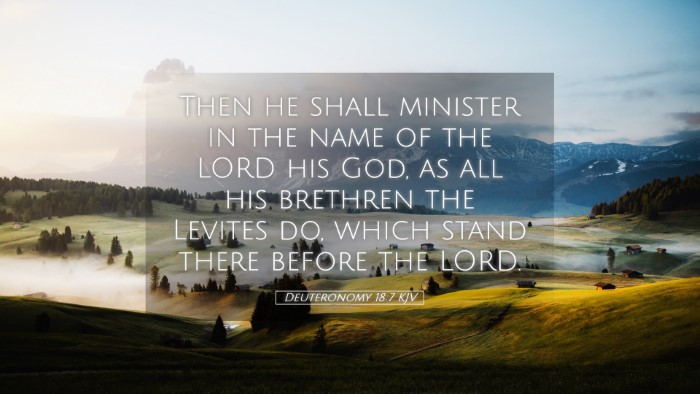Commentary on Deuteronomy 18:7
Verse: "Then he shall minister in the name of the LORD his God, as all his brethren the Levites do, which stand there before the LORD."
Introduction
The verse Deuteronomy 18:7 serves as an essential reference regarding the role and service of the Levites in Israel. In the context of the Mosaic Law, the Levites were set apart for religious duties and responsibilities, primarily pertaining to the worship and service of God. This commentary aims to draw insights from renowned public domain commentaries to explore the implications of this verse for past and present communities of faith.
Contextual Background
The broader context of Deuteronomy involves Moses' final addresses to the Israelites before they enter the Promised Land. The chapter elaborates on the roles of priests and Levites, distinguishing their sacred duties from those of the laity. This positioning of the Levites is significant as it illustrates God's intention for spiritual leadership among His people.
Insights from Matthew Henry
Matthew Henry notes that the Levites' ministerial service is a divine calling, highlighting that God has appointed them to serve in a sacred capacity. He emphasizes the significance of their work and the honor in ministering before the Lord. According to Henry, their service represents a commitment not only to perform rituals but also to lead the people in worship and intercession.
- The Levites' Duty: Henry highlights that the Levites were to educate the people about the law and guide them in righteous living. Their role was instrumental in maintaining the covenant relationship between God and Israel.
- Unity in Service: The emphasis on the Levites ministering "as all his brethren the Levites do" indicates a collective responsibility among the Levites to uphold God's standards of holiness and service.
Insights from Albert Barnes
Albert Barnes focuses on the implications of the Levites' ministry concerning the broader community. He asserts that the Levites serve in the name of the Lord, which denotes their authority and authenticity derived from divine appointment.
- Divine Authority: Barnes points out that serving in the name of the Lord conveys both power and responsibility, laying the foundation for spiritual leadership in Israel.
- Accessibility of the Priesthood: He further remarks that the sharing of ministry among the Levites underscores the accessibility of religious leadership to all who are called. This concept is foundational for understanding the nature of community ministry.
Insights from Adam Clarke
Adam Clarke elaborates on the nature of the Levites' call to ministry. He remarks on the importance of their unique position among the tribes of Israel, which symbolized an exclusive commitment to God. Clarke’s commentary reveals the theological depth of the Levites’ service.
- Separation and Commitment: Clarke emphasizes that their separation from the other tribes to serve signifies a greater purpose, as they were devoted fully to God’s service and the spiritual welfare of the nation.
- Symbolism of Service: He also likens the Levitical ministry to a foreshadowing of the New Testament ministry, where believers are all called to be priests, participating in God’s mission through Christ.
Theological Implications
The theological ramifications of Deuteronomy 18:7 have enduring significance for contemporary faith communities. The acknowledgment of a divinely appointed ministry reflects the nature of God's governance and His desire for His people to have leaders who are dedicated to His service.
- Call to Ministry: This verse invites ministers today to reflect on their calling in light of God’s commands. The ministerial role is not merely a job but a calling to serve God's people in truth and righteousness.
- Role of the Community: As the Levites served not only in ritual but in teaching and guiding, modern-day faith leaders are tasked with shepherding their congregations, fostering spiritual growth, and deepening the understanding of God's word.
Conclusion
In summary, Deuteronomy 18:7 is a pivotal verse elucidating the divine nature of the Levitical ministry. The insights from Matthew Henry, Albert Barnes, and Adam Clarke collectively paint a picture that extends beyond ancient Israel, incorporating implications for contemporary spirituality. Pastors, students, theologians, and Bible scholars can take away the importance of dedicated service, the divine authorization of ministry roles, and the collective mission of leading God’s people as they navigate their faith journeys.


